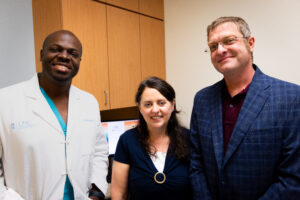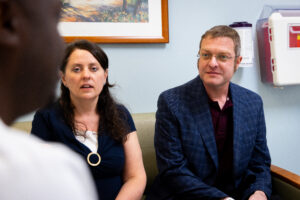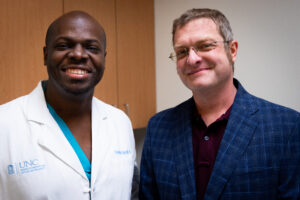“We wanted to do everything we possibly could so that our son gets more time with his dad.”
In January 2024 Sam developed a headache that would not go away. He then started experiencing fainting spells. On February 24, 2024 while attending a birthday party with his 8-year-old son, Sam started to feel unwell. His wife Karen noticed that he looked pale and was struggling to stay conscious, so she drove him to the emergency room. Scans in the emergency room showed inflammation in the brain, so Sam was sent to another hospital in Ohio. A biopsy confirmed that Sam has a malignant brain tumor, a glioblastoma (GBM).
24, 2024 while attending a birthday party with his 8-year-old son, Sam started to feel unwell. His wife Karen noticed that he looked pale and was struggling to stay conscious, so she drove him to the emergency room. Scans in the emergency room showed inflammation in the brain, so Sam was sent to another hospital in Ohio. A biopsy confirmed that Sam has a malignant brain tumor, a glioblastoma (GBM).
Because of the severity of the diagnosis, and after hearing that Sam was not considered a candidate for surgery, Sam and Karen wanted to get a second opinion and determine what treatment options may be available. Members of Sam’s neurosurgery team in Ohio reached out to Dr. Soma Sengupta, Division Chief of Neuro-Oncology at UNC Health.
Both Karen and Sam spoke with Dr. Sengupta on the phone before traveling to North Carolina for an appointment. “Dr. Sengupta said ‘we may not have a different opinion, but if you come, we will look at it and you will have peace of mind knowing that you did everything that you could’,” recalled Karen.
At the end of March, Karen and Sam drove from their home in Ohio to Chapel Hill, NC, carrying Sam’s MRI images on a disc, and not knowing if they would be staying for treatment or traveling back home to Ohio with the same news. During their appointments, they met with Dr. Dominique Higgins, Director of Neurosurgical Oncology at UNC Health. After evaluation of the MRI images, Dr. Higgins told Sam and Karen that he felt confident that he could remove the tumor and that he would put Sam on the surgery schedule for the following week.
 During their time in North Carolina, Sam and Karen stayed at the SECU Family House that offers safe and affordable housing for patients and their families who travel to Chapel Hill for life-saving procedures and serious illnesses. “The SECU house was great,” said Karen. “I had never needed to use anything like this before. I didn’t know that it existed. It’s really nice and a huge stress reliever.”
During their time in North Carolina, Sam and Karen stayed at the SECU Family House that offers safe and affordable housing for patients and their families who travel to Chapel Hill for life-saving procedures and serious illnesses. “The SECU house was great,” said Karen. “I had never needed to use anything like this before. I didn’t know that it existed. It’s really nice and a huge stress reliever.”
On April 1, 2024 Sam went in for his surgery. “His tumor was challenging in that it spanned three lobes of his brain,” said Dr. Higgins. “However, we were able to resect all of the aggressive parts of the tumor in the brain itself through a single approach. The hope now is that the combination of the clinical trial, radiation, and chemotherapy will treat the unresectable portion that remained.”
“We wanted to do everything we possibly could so that our son gets more time with his dad.”
After surgery, Dr. Higgins informed Sam and Karen that he was able to remove more than 90% of the tumor. The successful resection of the tumor is critical going into standard-of-care treatment and for patients wishing to enroll in clinical trials. “We were told in Ohio that there was not enough of a benefit to try to remove his tumor,” said Karen. “UNC did that for us.”
resection of the tumor is critical going into standard-of-care treatment and for patients wishing to enroll in clinical trials. “We were told in Ohio that there was not enough of a benefit to try to remove his tumor,” said Karen. “UNC did that for us.”
Sam qualified for enrollment in a multicenter Phase 2b clinical study. The study administers a combination of immunotherapy developed by a biotech company called Imvax. Immunotherapy is treatment that uses a person’s own immune system to fight cancer. Immunotherapy can boost or change how the immune system works, so it can find and attack cancer cells. This personalized immunotherapy approach has promise in extending survival for GBM patients.
Sam then underwent two additional procedures as a part of the clinical study. One week after surgery, Sam was discharged from the hospital and made the 10-hour drive back to his home in Ohio. Sam had some discomfort getting in and out of the car, but he was able to ride in the car without much pain.
Six weeks after treatment, Sam will proceed with standard-of-care treatment, adjuvant chemotherapy and radiotherapy, back home in Ohio. This will allow Sam to be home with his son. “We wanted to do everything we possibly could so that our son gets more time with his dad,” said Karen. “That is driving everything. I want him to know that we did all this to try and get something better for him, too.”
“We want to be realistic, but we hope for the best outcome and prepare for the worst.”
 Sam and Karen now spend their time going on daily walks and being together as a family. Sam is optimistic and wants to keep fighting to have more time with his son.
Sam and Karen now spend their time going on daily walks and being together as a family. Sam is optimistic and wants to keep fighting to have more time with his son.
While the resection surgery went better than expected, there is still a lot of unknown in Sam’s future and many abrupt changes to their family. The two are currently navigating the challenges that come with a long-term diagnosis like glioblastoma, and the effects of the tumor on his peripheral vision.
Sam is also a US Army veteran and served in Afghanistan. While there, he was exposed to the toxic chemicals released from burn pits. Glioblastoma is one of the cancers related to burn pit and other toxic exposure, something that both Sam and Karen did not think much of until after his diagnosis.
Sam says that he does not feel pain, but that he is all too familiar with the flu-like side effects that come with radiation treatment. “I had a prior bout with Hodgkin lymphoma when I was 20,” said Sam. “I know I’ll be a little more tired and a little more queasy. I fully expect that.”
Both Sam and Karen are hopeful that the surgery, treatment, Imvax clinical trial, and ongoing brain cancer research will give them more years together. “We want to be realistic,” said Karen. “But we hope for the best outcome and prepare for the worst.”